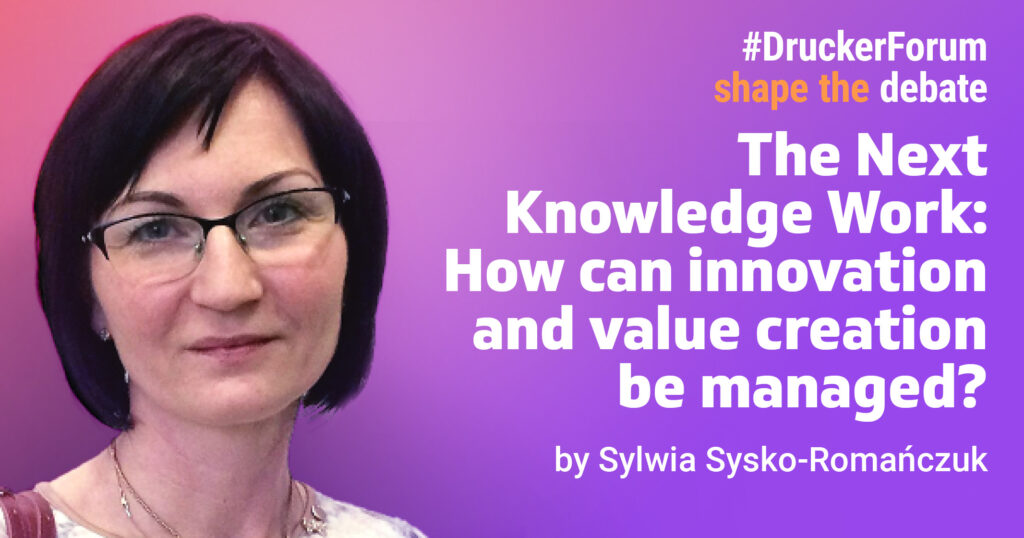
Peter Drucker aptly noted, “The most valuable asset of a 21st-century institution, whether business or non-business, will be its knowledge workers and their productivity.” Following him, Richard Straub – President of the Peter Drucker Society – claims that knowledge has become the most critical resource in the modern economy, surpassing even physical assets in importance. Managing knowledge work and knowledge workers is pivotal for fostering innovation and creating new value. This shift is driven by several transformative changes, including the rise of artificial intelligence (AI), remote work, and collaborative platforms. To navigate these changes effectively, organizations need to adopt new management practices that prioritize the productivity and creativity of knowledge workers.
The Evolution of Knowledge Work
Peter Drucker, who coined the term “knowledge work,” described this evolution as a shift from applying knowledge to work to applying knowledge to knowledge. This transformation signified a move away from physical labor to intellectual and service-oriented tasks, fundamentally altering the economic landscape. In turn Karen Linkletter, Research Director at MLARI, says that traditionally, knowledge workers were defined by their expertise and the specific knowledge they brought to their roles. These workers were often managed through structured processes and hierarchical systems, focusing on efficiency and adherence to established methods. Their motivation mainly stemmed from job security, salary, and professional development opportunities. Today, knowledge workers include a broader range of professionals, many of whom operate in dynamic, tech-driven environments. The rise of AI and digital tools has changed the nature of their tasks, requiring a focus on creativity, problem-solving, and continuous learning. The post-pandemic scalability of remote work has also decentralized teams, requiring new coordination and communication strategies.
Managing Knowledge Work changes in the AI Era
AI technologies, particularly large language models (LLMs) like GPT-4, are revolutionizing knowledge work by automating complex tasks, generating insights from vast datasets, and enhancing decision-making processes. LLMs offer unprecedented scope, volume, and speed in managing knowledge. They can generate artificial texts that fundamentally change the landscape of knowledge management so enabling new forms of epistemic management.
Integrating AI into knowledge work raises critical questions about enhancing knowledge work productivity. In 2018 H. James Wilson and Paul R. Daugherty from Accenture claimed that leveraging AI for value creation will foster a collaborative work environment.
Indeed generative AI enhances higher-order cognitive processes such as critical thinking, creativity, and knowledge sharing. AI can help knowledge workers ask better questions, generate innovative ideas, and communicate more effectively. AI tools facilitate brainstorming sessions, create strategic narratives, and evaluate new concepts. Knowledge workers use AI tools to analyze large datasets and identify trends and patterns, as well as actionable insights that might drive innovation and competitive advantage. Additionally, AI can challenge decision-making by offering predictive analytics and scenario planning.
This augmentation allows knowledge workers to explore a broader range of solutions and improve their performance in unstructured tasks. Many of AI algorithms can significantly enhance the productivity of knowledge workers by handling routine and data-intensive tasks, allowing employees to focus on more strategic and creative activities.
In addition, the rise of collaborative platforms and remote work technologies has also transformed how knowledge work is conducted. These tools enable seamless communication and collaboration across geographically dispersed teams, fostering a more inclusive and diverse work environment. To maximize the potential of these platforms, organizations invest in robust digital infrastructure and create a culture of open communication and collaboration.
New Management Practices for Knowledge Workers
In AI-powered work environments, traditional management practices often fail to meet the needs of modern knowledge workers. Hierarchical structures and rigid processes can stifle creativity and innovation. That is why organizations adopt more flexible and adaptive management styles that empower employees’ creativity and entrepreneurial spirit and encourage experimentation.
New management practices are anchored on:
– Decentralized Decision-Making – allowing teams more autonomy to make decisions can speed up innovation and increase employee engagement.
– Continuous Learning and Development – investing in ongoing training and development programs ensures that knowledge workers remain at the forefront of their fields and can effectively leverage new technologies.
– Performance Management – developing new performance indicators that reflect creativity, collaboration, and impact on long-term goals.
This involves fostering a culture of innovation, encouraging risk-taking, and supporting continuous learning.
The Role of Leadership in the Next Knowledge Work
Adaptable, empathetic, forward-thinking leadership is crucial, and capable of guiding their teams through constant change and uncertainty. This requires focusing on diverse and inclusive leadership pathways. Organizations should identify and nurture potential leaders from within, offering mentorship and growth opportunities that align with the evolving demands of knowledge work. This approach ensures that leadership remains dynamic and capable of driving future innovations.
Embracing the Future of Knowledge Work
As AI continues transforming knowledge work, organizations debate how to implement these technologies responsibly. Top priorities are addressing ethical concerns, such as data privacy, algorithmic bias, and potential employment impacts. To remain competitive involves continuous monitoring of technological advancements, investing in research and development, and fostering a culture of agility and resilience. By proactively embracing change, organizations can create new value and drive sustained innovation.
The next era of knowledge work promises unprecedented value creation and innovation opportunities. Management and leadership has to change to embrace it and unlock the enhanced value that AI and knowledge work brings.
How that might happen, with particular emphasis on AI questioning to cause how culture and leadership could evolve, will be the subject of another blog.
About the author:
Sylwia Sysko-Romańczuk is professor of innovation and entrepreneurship at Warsaw University of Technology with research interests in value-driven growth in the digital and networked economy.

